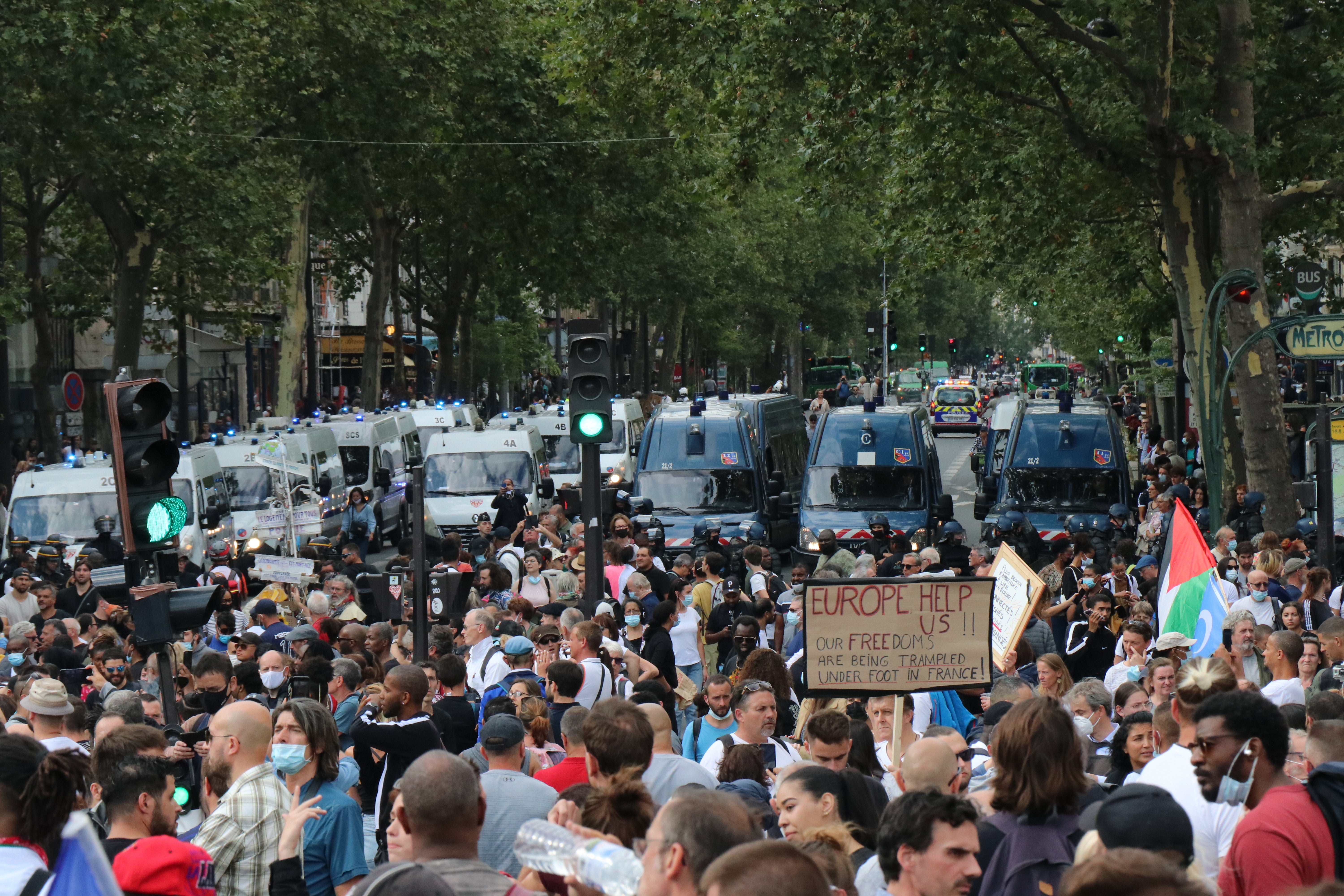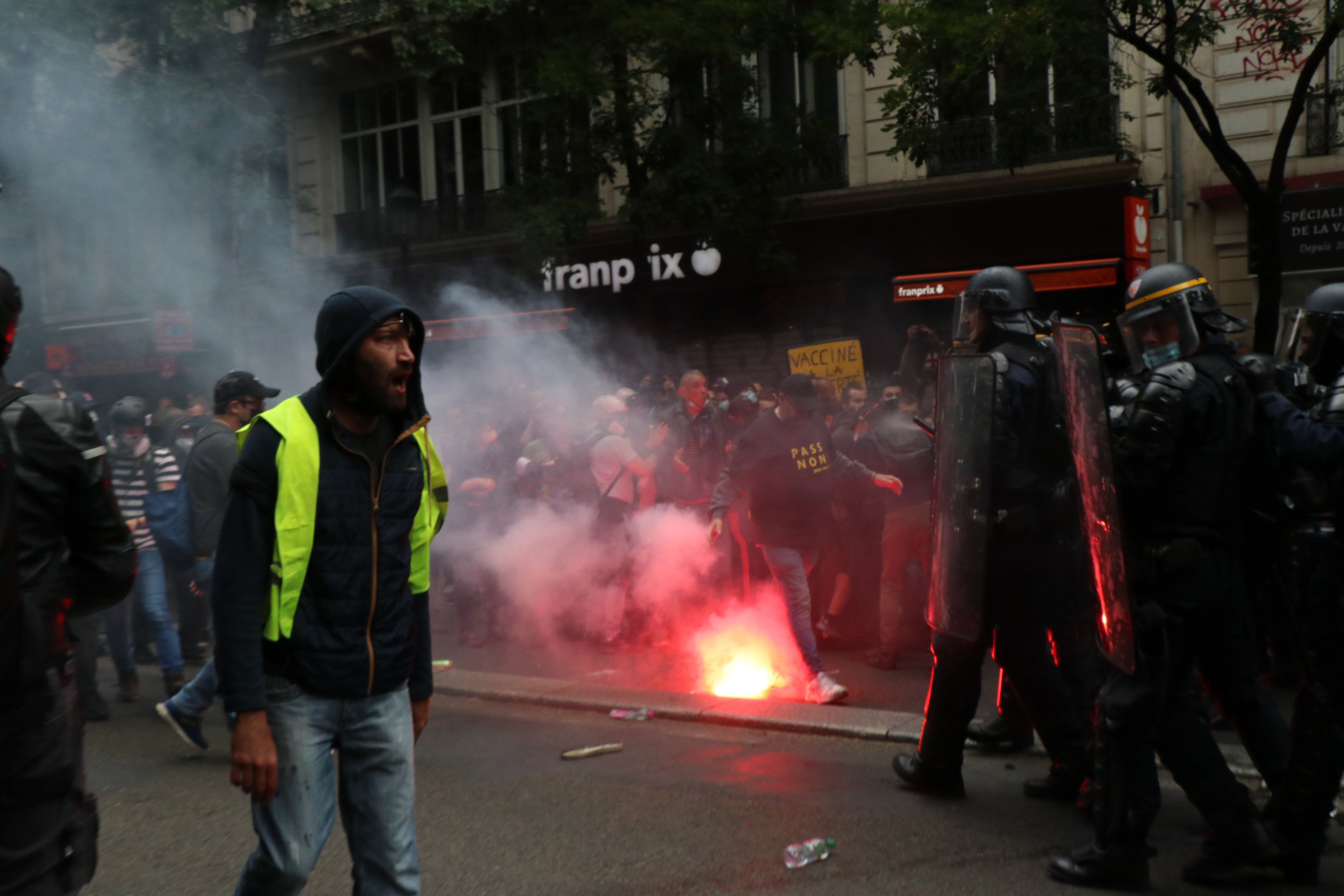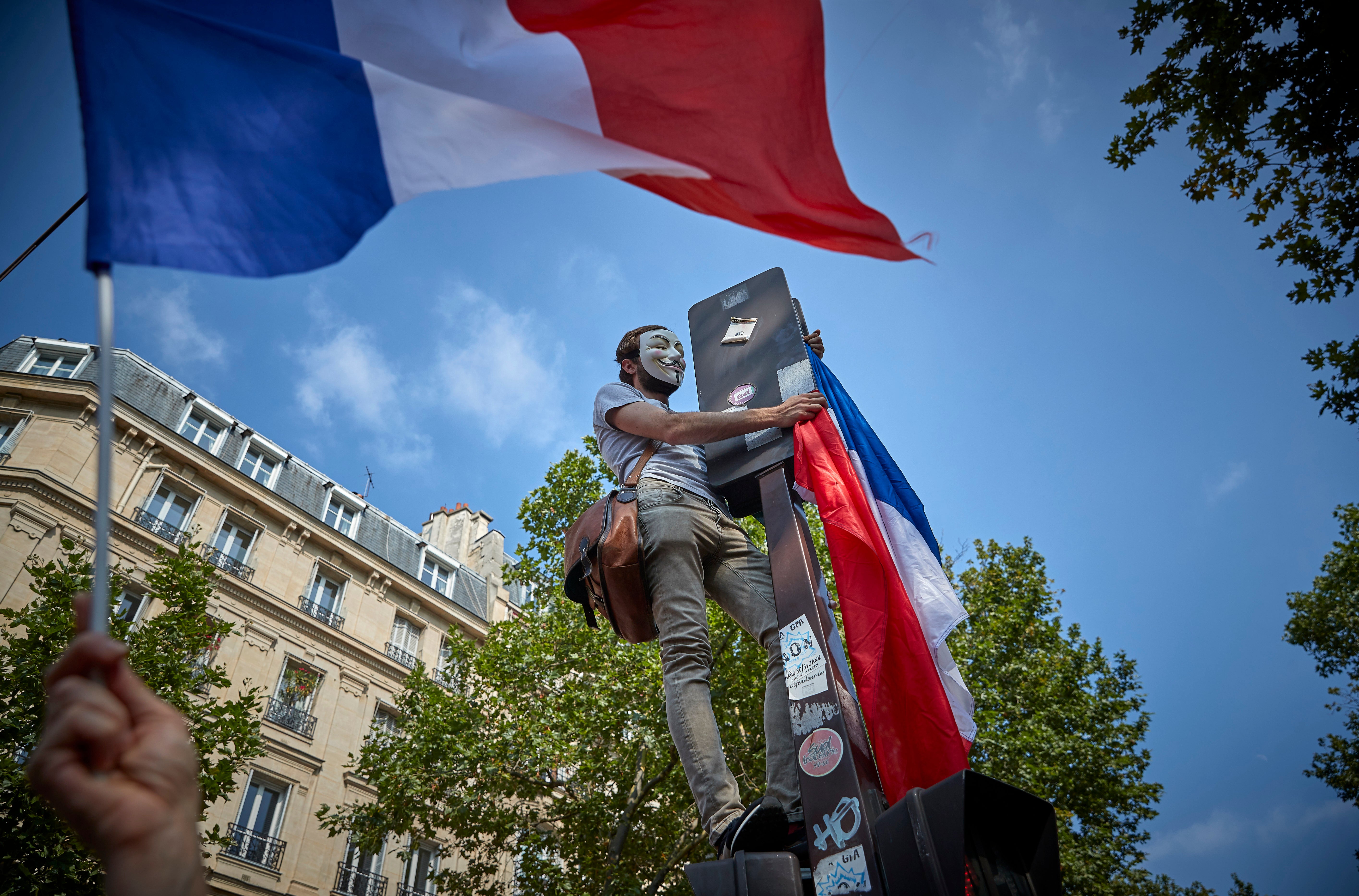France anti-vax and anti-health pass protests take aim at Macron
Protests are uniting people on the far right and the far left, and appear to be gathering momentum, writes Chris Bockman from France

It’s a battle of numbers. Last weekend 160,000 took to the streets across France against the Covid vaccination programme and looming restrictions on those without jabs. At the same time President Macron, 16,000km away in French Polynesia, sent a self-congratulatory tweet promoting his “tough-love” approach.
He said a new milestone had been reached with 40 million French citizens having received at least one Covid-19 vaccine, a month ahead of schedule. That represents around 60 per cent of the French population and the government has now set a target of 50 million people being vaccinated by the end of August.
However, the anti-vax movement in France is also growing rapidly. Yesterday more than 200,000 returned to the streets, taking part in 184 rallies across France, according to the French interior ministry, despite the unseasonably bad weather.
Some of the street protests have turned violent, a vaccination centre was burnt down in the French Basque country and several mock guillotines with the names of politicians backing the vaccination campaign have been found near Bordeaux.
Pascal Gaissot, a civil rights activist and long-time observer of protest movements in France, told me he had never seen demonstrations take off and grow as quickly as this one in the middle of summer. “Even during the gilets jaunes protests, by the end of June, outside Paris, the protests usually brought together no more than several hundred people in provincial cities like Bordeaux or Toulouse, which were at the forefront of the rallies.”
What you have in these protests is the far right and far left marching side by side. That makes no sense but all they have in common is they want to kill the king
He said so far the anti-vax movement is highly unstructured and different political factions on both the far right and left are trying to drive it. “It would be wrong to say the majority of the protesters are against the vaccination campaign. From the slogans and the banners the one cause unifying everyone out on the streets is the real fear that their civil liberties could be restricted if they don’t get vaccinated,” he added
There is no question the new passe sanitaire or health pass law will have a huge impact on anyone who has not been vaccinated against Covid-19 by reducing their freedom of movement and ability to socialise, and in some cases go to work.
Proof that you have been vaccinated will be needed for any long journeys by train or plane, to go to a restaurant or even an outdoor cafe. Medical staff in hospitals or retirement homes who haven’t been vaccinated won’t be able to go to work and will have their salary docked.

The bill, which has gone through both the Senate and the lower house of parliament, or National Assembly, now has to clear a final hurdle next week the Conseil Constitutionnel, or Constitutional Council, which has the power to review new legislation to ensure it is legal. If it gives the bill the green light the government says it will come into force on Monday 9 August.
The ability of the anti-vax movement to stop the bill from becoming law appears limited. Coralie Richaud, a researcher at the University of Limoges law school, studies protests movements launched on social media networks.
“For the time being there is no spokesperson who stands out, there are a lot of angry people but no clear single message has emerged. Without that, protests generated on social media rarely last long out in the real world. That’s what happened with the gilets jaunes movement too,” she said
In fact, some of the protesters turning up at the demonstrations across France now are still wearing their yellow vests. But, according to Professor Ivaldi from the Toulouse School of Economics, the only real link between the gilets jaunes protesters and the anti-vax movement is a visceral hatred of President Macron.

He told me: “What you have in these protests is the far right and far left marching side by side. That makes no sense but all they have in common is they want to kill the king. They are not complaining about their social and economic conditions but dictatorship and lack of freedom.”
“If the fourth wave of the Covid pandemic is really bad then they are the ones most likely to be hit hard as they are not vaccinated and then they will change their minds,” he added.
As well as the usual conspiracy theories on the web about the harm of vaccines, some protesters generated a nationwide backlash as they wore yellow stars comparing their situation to Jews forced by the Nazis to wear them in public.
It would be wrong to say the majority of the protesters are against the vaccination campaign. From the slogans and the banners the one cause unifying everyone out on the streets is the real fear that their civil liberties could be restricted if they don’t get vaccinated
Professor Ivaldi points out that, unlike the gilets jaunes protests, which were sparked by a rise in fuel tax, President Macron has had cross-party support for his new legislation.
“The centre-right voted for the passe sanitaire following some compromises with the government and so far the benefits of the vaccines heavily outweigh the negatives.”
Opinion polls even show there has been strong support for President Macron’s stick and carrot approach to the vaccination campaign, in other words jabs in exchange for a return to a more normal way of life.
Paris-based political analyst Bernard Sananes, who runs an opinion poll agency, Elabe, said there has been a surge in vaccination appointments since Macron spelled out the new passe sanitaire rules in mid-July – more than 4 million in less than three weeks, a nearly five-fold increase.
However, he says 16 per cent of adults will probably never be persuaded to get vaccinated despite concerns a fourth wave of the virus could peak as early as the end of August.






Join our commenting forum
Join thought-provoking conversations, follow other Independent readers and see their replies
Comments